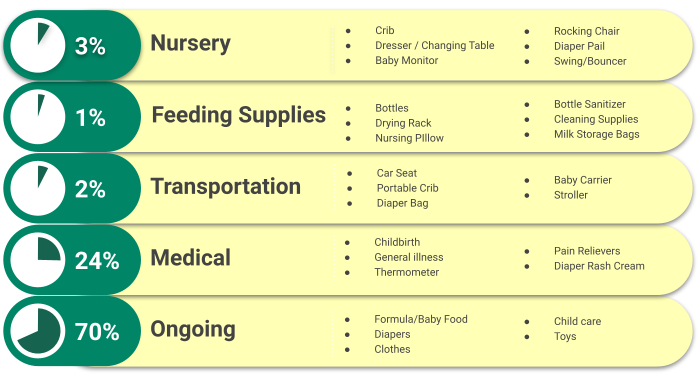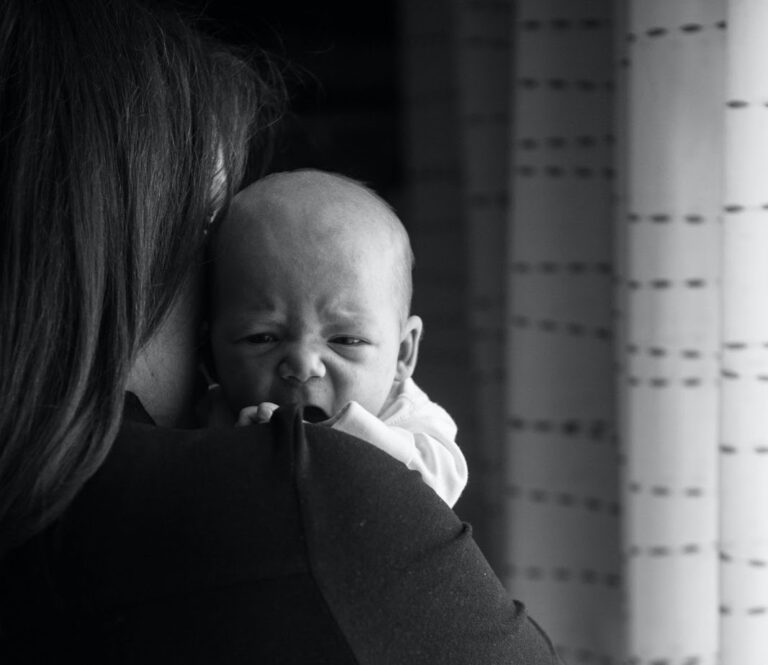When you search the internet for ‘how much does a baby cost’ you are inundated with ambiguous numbers that may or may not even apply to your personal situation. Here we break down the average cost of having a child in the first year of their life.
Breakdown of how much a baby costs

When added together, these costs amount to a whopping $19,363 for Year 1! If this number scares you – we get it! But do not stress. Let me break down some of the higher costs, how they may differ for you and what you can do to plan ahead:
Baby expense: Nursery – $640
Nursery supplies are often the first expenses that come to mind when answering ‘how much does a baby cost’. However, these one-time purchases are a lot smaller than you may think. In total, they represent just 3% of your overall baby budget. This price could easily be double if you go for top-of-the-line items, and it could also be free if you are gifted nursery supplies or reuse items from your previous child. In general, the most expensive items are the rocking chair and the crib – two items that for most families are non-negotiable purchases.
Planning tip: Check with your network to see if anyone can gift or sell you second-hand supplies. Parents are here for each other, and it’s an opportunity to create a special connection.
Baby expense: Feeding supplies – $243
This includes all the bottles, cleaning supplies, nursing pillows, and more that go into feeding a baby. It does not include the cost of formula (see below) or a breast pump.
Planning tip: Reach out to your insurance company to receive a free pump.
Baby expense: Transportation – $380
Similar to nursery products, this bucket of expenses could easily cost you double, with some stroller/car seat combos costing $1,000+. However, your costs overall could be lower if you receive many gifts. These projected expenses are based on lower-cost quality items such as a car seat, portable crib, stroller, and baby carrier. These costs include baby-specific transportation needs, not the cost of your normal family transportation needs like gas and insurance.
Planning tip: Check out sites like OfferUp where you can find discounted second-hand baby gear.
Baby expense: Medical – $4,660
The cost of having a child in the US with insurance averages $4,500 in out-of-pocket expenses. This cost alone dwarfs all other medical expenses for parents. We have also included here other common expenses that you will likely incur in a baby’s first year, such as pain relievers, a thermometer, diaper rash cream, and frequently prescribed items like vitamin D drops or iron supplements.
Planning tip: The average American family can save 29.8% on all qualified medical expenses, including the out-of-pocket cost of birth, by moving money into a Health Savings Account. That’s a saving of $1,341!
Baby expense: Ongoing – $13,440
When we think about how much babies cost, we tend to look up the cost of cribs and car seats. However, the reality is that the largest cost of having a child is not the nursery itself, but your increase in daily expenses to care for your newborn. This is also the budget item that can vary the most, depending on your situation. For instance, our estimate includes $1,560 for baby formula. However, if your child is breastfed for any amount of time, this figure drops significantly.
Our estimate also includes $10,800 for childcare costs. This is roughly the average cost of childcare in the United States, for 9 months (assuming a 3-month maternity leave). We have also added ongoing expenses like clothes, toys, and diapers.
Planning tip: If your employer offers one, you should 100% sign up for the Childcare Flexible Spending Account (FSA). Directing part of your salary into a Childcare FSA and using this money for childcare expenses, you save the income taxes you would have otherwise paid the government on that money.
How much does a baby cost? The “other” bucket
We didn’t add an “other” line item, but you should when considering your budget. Here are some other categories to consider:
- Saving for college
- Saving for private school
- Life insurance for you
- Life insurance for your child
It’s always good to start on these saving tools early in your child’s life, should your budget allow.
So what is the answer to ‘how much does a baby cost?’ Well, it depends on your situation. Sorry, I said it!
In summary
- How much does a baby cost? About $19,363.
- Roughly 70% of the first year’s budget will be recurring expenses like formula and childcare.
- See how Pasito can help support your financial wellness!
Refer Pasito to your company to help take some of the financial stress off your shoulders. Through personalized benefits and financial guidance, Pasito increases the value of your company’s overall compensation package and helps you cut down on thousands of taxes annually. These tax savings can then be distributed elsewhere (think: baby expenses), thus increasing your financial wellness.
Disclaimer: We try our best to provide you helpful content. However, we do not offer financial, legal, or tax advice. Please speak with a professional about your personal situation.



